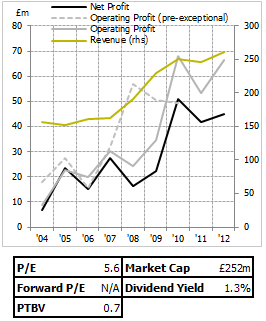 The kick for Camellia (LON:CAM) came from Richard Beddard, so thanks to him for that. I unashamedly like to run around the blogs and see if anyone else is talking about anything I might be interested in - investing is all about aggregating and processing information, after all, and my fellow bloggers are a great source of it - and Camellia is one of those which I hadn't seen before. That's a little strange, since I would've thought with its characteristics I would've seen it on some screens somewhere, but there's a lesson for you - nothing beats some bottom-up research, or just trying to see as many different companies as possible!
The kick for Camellia (LON:CAM) came from Richard Beddard, so thanks to him for that. I unashamedly like to run around the blogs and see if anyone else is talking about anything I might be interested in - investing is all about aggregating and processing information, after all, and my fellow bloggers are a great source of it - and Camellia is one of those which I hadn't seen before. That's a little strange, since I would've thought with its characteristics I would've seen it on some screens somewhere, but there's a lesson for you - nothing beats some bottom-up research, or just trying to see as many different companies as possible!
A dubious crown
Camellia, then, is a fairly large (in asset terms) business with their finger in rather a few different pies. Predominantly, though, their business is agriculture - the growing of tea is their biggest cash cow. Let me stop here, though, while it sounds relatively normal - Camellia is one of the strangest businesses I've looked at, from a number of different perspectives. Let me start with the most obvious: why does a business which has £236m of net assets tied up in agriculture, and very profitably so, also feel the need to operate businesses in engineering, food storage and distribution and even - most peculiarly - a bank?
I suspect Camellia's management would say that's an unfair question, and answering it probably says a lot about what you think a PLC should be. Why not have all these businesses together? After all, a company's obligation is primarily to its investors - to earn a decent rate of return. It's fairly clear by reading Camellia's reports and website that they have an unerringly long-term focus, so perhaps that's simply the be-all and end-all. Only it's not - Camellia is a business of a different breed from most I look at. Check out their 'about' page on their website, linked here. Here are a few choice tidbits for those of the unclicking variety:
We see ourselves more as custodians or trustees rather than owners, that is, we do not see these assets as objects or commodities or bits of paper that can be traded, but rather, as living entities from which, if properly managed, we might earn an attractive return…

.png)


